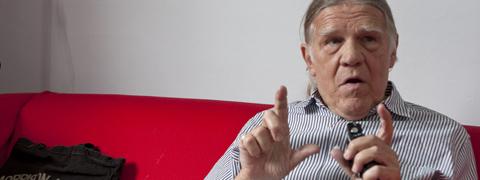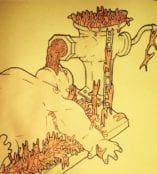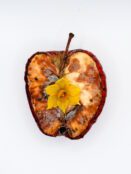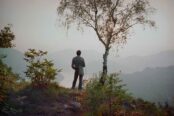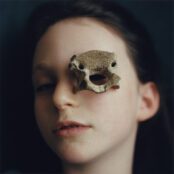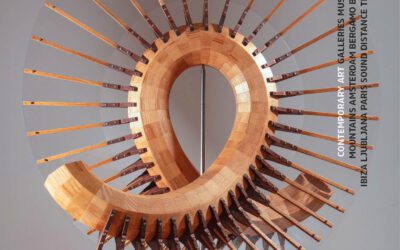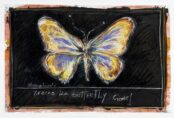[dropcap style=”font-size:100px; color:#992211;”]T[/dropcap]rebuchet’s Sarah Corbett and Carl Batson interviewed photographer Henry Diltz at Soho’s Gibson Rooms.
Earlier, Diltz reminisced about his photographic subjects, amongst them The Doors, Crosby, Stills and Nash and The Rolling Stones. The second part of the interview takes a turn for the technical, political and philosophical.
How much editing and photoshopping do you do?
None, none at all. I never developed a roll of film in my life when I shot film; I gave it to the photo lab. I don’t even know how to download the stuff from this. I go home, I take the chip out, I give it to my assistant and I say, please download this onto the computer and she downloads it and I have about eighty thousand little things from these little cameras from the past five or six years and I haven’t even stopped to look through them all yet.
[quote]There’s more of us
than there is them.
Let’s just organise
and vote and get
rid of every one of
them and put in
some young, hip
people right out
of college who don’t
have a job anyway[/quote]
In fact people get really mad at me because I’m on with the next thing. I never go back and say, “Oh yeah I’ve got to look through those”. Sometimes I have to, so I tell my assistant, “Please pull up those pictures for me from that party and send them off”. I honestly don’t have time to do all that.
In the days of film, I never developed a roll, I never printed or anything. I realised that if I’m going to spend the whole day shooting then I don’t want to spend the whole night in the darkroom so I would give it to a photo lab, they’re the professionals, let them do it, let them print it.
The way I photograph is to fill the frame anyway and framing is the whole thing in photography, I think, once you know the technical part, and with these cameras there is no technical part (laughs and gestures to his digital compact camera). I have a framing Jones, I like to frame, it makes me feel good, it makes me feel balanced.
Carl: Do you ever shoot on film now?
Not at all, just totally gone now, I think. It’s kind of hard to buy it; I know a few camera stores that sell film. It’s hard to get it developed. It’s expensive now, Jesus, a proof sheet was about 2 dollars 50 cents, now it’s about 15 dollars! I can’t afford it. That’s the other thing, it’s free once you get into digital.
The other thing is the delivery system of digital is so great. When you shot transparencies, you had to give those to the client and there were no negatives so you’d give away what you’d shot. Often you’d look through and you’d have to pick, you’d say, “Well I want to keep a couple of these just to remember and this is my favourite, I want to keep this. But that’s probably the one they want to use so I’ll give it to them and I’ll keep this second one”.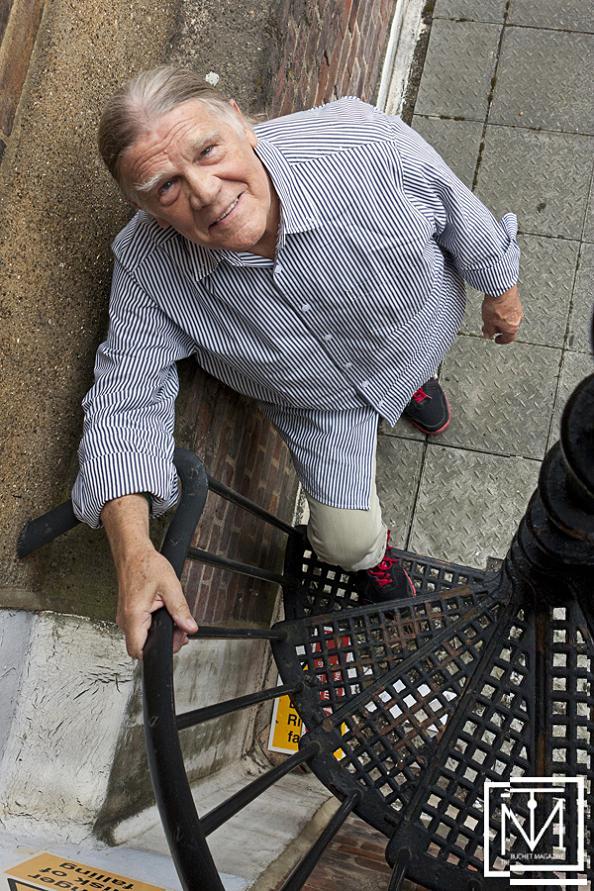
You had to make those choices. Now you don’t have to because you keep it all and you give it all; everyone’s got it.
The other thing is, say you shot a group and took pictures all day, say ten rolls of film, you drop them off at the photo lab, you have to go back a day or two later, pick them up, says it’s black and white, pay for the proof sheets, deliver those to the group a day later, they got to mark them, give them back to you, you go back down with the negatives, print these, then you’re probably paying for the prints as well upfront.
Then you bring the prints back to the band, stamp your name on the back of all of them, give them to the band and hope they’ll pay you the 300 or 400 bucks you’ve already spent getting all that done and it’s taken a week. Now, you shoot, you put it on a disc and everyone’s got it, the end. Here’s everything I shot, go ahead, use whatever you want, you know.
I don’t ever crop my photos; I don’t ever do anything to them. Early on when I was shooting slides, I realised that whatever I saw is what I wanted to put on the wall exactly that way and I would frame it.
You know if I wanted those three guitars (points at wall), I would frame it so I saw those three colours together. I didn’t want a bunch of space around it. I would just move in and out and get it just the way I wanted it, take it and that’s the picture. There is nothing else to do to it. Then you project it and, “Ah yeah, that’s what I saw, that’s exactly what I saw”.
I suppose some people just willy-nilly take pictures and later they worry about cropping and doing all that stuff but I never did it that way. Because I was shooting slides, it’s not like printing in a dark room where you can play around with it. The slide is what it is, that’s it. So it’s just a holdover from that.
These days with smartphones, it seems that everyone has a camera – do you think that has deskilled photography or is the increase in photographers a good thing?
It’s good, everyone’s so aware now of photos. There are still good and bad photos and people do it for personal reasons, they’re shooting pictures of their friends in the club and their friends here and there. They’re good for them. Maybe they’re not going to win awards but they’re going to remind you of that great time you had last night and that’s the point.
There are different kinds of photography. If you want to have it in a magazine, then it’s a different kind of a thing I suppose. Everyone can take a picture. Everywhere you look there’s stuff, but what’s going to make a good picture and what isn’t, that’s the point.
Do you think some people have a natural eye for photography or can it be learned?
I think you have to learn it. Look, I love the way that building looks over there, out of the window (he takes several pictures of said building) and that’s satisfying to me, just to frame that up (shows me the picture) and have it just there. It’s balanced, you know. Now I feel good. That’s made me relaxed. Will I use that? Probably not but I don’t know, maybe it’s a category of buildings outside of windows.
But like I say, it’s not so much the photo I’m taking, as it is what it feels like to take it. The moment of taking it is the fun, that’s the activity of it. The fact that some people will want to use them and they can be used is great.
[quote]There are so
many photographers
so now groups
don’t have to hire
a photographer so
much – they want
to sling ‘em out[/quote]
But when I was taking these photos in the 60s of all these people who became famous shortly after that, luckily, I was having fun doing it. I wasn’t thinking, “I want to get this photo of this guy”. I never once thought, “Someday I will have this history of…” I never once though of that, in fact it was a big surprise to me twenty years ago when people started saying to me, “Oh you must have quite an archive,” and I’d go, “Archive? Well that sounds a little too professional to me.” I don’t like the word but I do have boxes full of photos, it’s true.
And then I kind of organised them all and sorted them all out and now I make a living licensing the photos I took 40 years ago.
So what I say now is, all I wanted to do was take these photos, I didn’t want to spend the latter part of my life trying to find them for people! The second half of my life was trying to hunt down these things, you know, and they’re pretty organised, I can find them but there’s always one you can’t find. That just seems to be the case.
Yeah, I made a living taking the photos. I was being paid a little bit for using them on album covers or magazines and then you go through a period of time and that’s the beginning part. Then after time goes by, say 40 years, then you’ve got an archive and it’s historical and people want to reuse them for box sets or best of albums or books or videos or whatever it is, magazines, and you go through that.
And then you get into galleries and I started a gallery, which was just for my photos and we called it the Morrison Hotel Gallery. Then I invited Jim Marshall to join and Bob Gruen and Neal Preston, friends of mine, started showing their photos. Now we represent 90 photographers, now that’s the point of the whole thing; an inadvertent occupation was being a gallery owner, I didn’t plan that either. So that’s happened and then I certainly didn’t plan to be a licensing company to sell this stuff years later, but that’s happened as well. So then there’s galleries and then I think after that it’s books. Books and galleries happen after a number of years.
And then it’s museums, we’re starting to do a few museum shows and I suppose that will happen because we look back 40 years, so when you look back 40 years, museums are interested – you have history, we want to show that.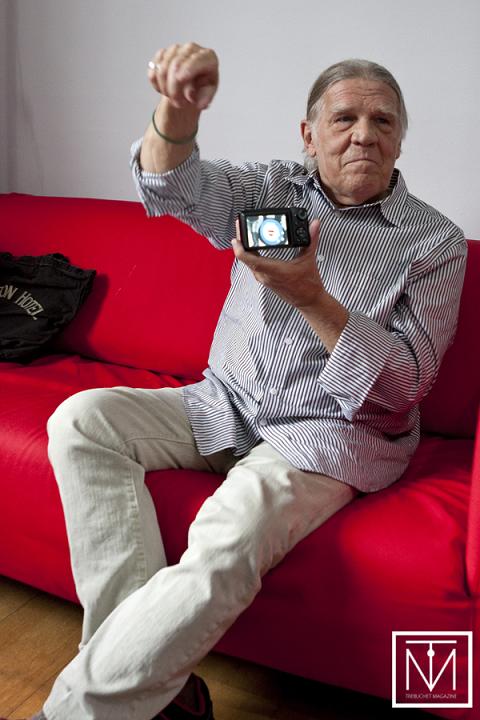
Like the DVD Legends of the Canyon, that’s 40 years ago, 40, 45 years, so we’re looking back now, people are interested in that. Kids say to me, “You’re lucky, you got to photograph the 60s,” and I say, “Well yeah, but you can photograph right now.”
Carl: Do you think it’s harder to get access to groups now?
It’s harder to get access to groups because you’ve got to sign a release. There are so many photographers so now groups don’t have to hire a photographer so much – they want to sling ‘em out. But they still want to have somebody there to take the really cool photos so there’s room for somebody to do that.
What happened I think in the 70s and 80s is that unscrupulous people would go to a concert and then make a big poster and sell it and that’s merchandising, you can’t do that. You can editorially use, you can take a picture and use it in a magazine but you can’t make a poster or a t-shirt or a coffee mug with that picture because now you’re getting into their territory of merchandising. So that’s why that bit’s all changed.
So these kids will say, “Well you were lucky,” and this was in the early 2000s, and I say, “Well look, you’re living at the beginning of a new century. Wait 40 years, 50 years from now, people will say, ‘Wow you were there at the turn of the century, what was that like? What were those people like? What did they wear? What did the cars look like? What did the street look like?’”
I’ve had movie companies come to me and say, “We want to pay you X amount of dollars to look through all your photos of LA in the 60s because we’re doing a movie based in LA in the 60s and we want to see what the posters looked like on the street. What did the political posters look like? What did the graffiti look like? What did the cars look like? What did people wear?” And they will actually come, the art department, and pay me to use my images to show them, so why wouldn’t that happen in the future?
So kids, shoot your friends, whatever they’re wearing, because that’s going to change in 50 years.
In these days of airbrushing and PR companies, is it more difficult to get candid shots?
I don’t really think so, I mean I shoot candid shots all day long of people, it’s almost easier because you don’t stick out, like “Oh there’s a guy with a camera.” That’s no different than everybody else; everybody has a camera.
So when I was in the park the other day, I would stand there aiming right at somebody but it would look like I was just looking at my pictures and if they were some way away, they would have no idea that I was taking a head shot of them from so far away with this thing (indicates his camera and shows us some photos from the park) zoomed in. I can take somebody in that window over there. I could get a head shot of them from here with this. I can get a 200 or something, it’s a 20 times zoom. I can really get a very close-up shot of somebody.
This is an amazing camera, they get better and better. It’s not totally sharp but from here I’m getting that round part of that guitar over there and so when you do that, nobody knows that you’re zeroing in on them.
So the question was, can you take candid shots any more? I think you can. Sure, bands are probably more guarded for just the normal person to be there. If you were invited into a dressing room because you were a friend of a friend and you had a camera, they might not like you doing that.
But one thing about cameras now, you don’t have to go like this (indicates aiming obviously at someone) so you can sit here like this (indicates camera in lap) and take the picture without anybody knowing and that to me is quite brilliant.
Video cameras, you used to have to put them up to your eye and go like this (indicates) but nowadays you can have one sitting here with a little screen and you could be videotaping everybody and they wouldn’t even know it. I could take an hour video with this right now, you just sit here and have it running and nobody would even know.
Do you enjoy shooting video or do you prefer stills?
I do like video. It’s way different because stills is about framing and picking the moment. You know where I got a lot of practise was early on when I got hired by the teenybopper magazines to shoot The Monkees on their video set when they were filming. What they wanted were headshots for the magazine covers, for posters that the little girls would put on their walls, for full-page things in the magazine, they wanted headshots.
So I had a camera with a telephoto, I think it was a 180, we’d just sit and we’d squat among the light stands because when you’re a still photographer on a video set or a TV set especially, if you get in the way, you’re going to be out of there in a second, you’re a low man on the totem pole. So I realised and I squatted under the light stands so I would never be in the way. I would just sit there and I would just look and I would watch Davy Jones while he was there rehearsing, talking and he would maybe then turn around and laugh and I would take the photo.
Same thing at a concert, say Neil Young was playing, I’d get to a place where I could see him from the waist up, I’d get his guitar and I’d see him and I’d just wait and wait until he does something heroic and just take it. I’d just wait and just keep looking and looking and looking and then click.
So I would watch all The Monkees and then train just on their head, just to have a portrait framed in my camera and just wait until the second they looked great and then take it. It’s framing and it’s the moment; those are the two variables in taking a picture.
So, what about politics?
Politics, god it’s such a horrible mess right now. In our country, in the US, greedy, greedy politicians are all owned by the big corporations. Just things that have happened now – corporations can give unlimited amounts of money to candidates so they get their own. They give millions of dollars and then the politicians vote for what they want and they don’t represent the people any more, they represent the big money and the big corporations and it’s a shame.
It’s going to change. It’ll change because it has to change. They keep talking about a tipping point, we’ve got to get to the tipping point when it’s going to be revolution: “Ok, that’s enough, that’s it!”
Are there any particular people, groups or movements that inspire you at the moment?
I would like to see some young, hip people. I was thinking the other day, in Egypt in like one day, two days, they had a revolution by cell phones because the police beat up somebody that was well liked, some everyman person, and that was the tipping point. They said, “Ok, that’s it!” and they all got together on their cell phones and overthrew the government.
Why can’t we do that? Everybody’s tweeting and twittering and Instagramming. The young generation could just say, if there was somebody that had the guts and the charisma and just organised it and said, “Look, those old sons-of-bitches that are representing everybody in Congress are all screwed up terribly, they’re owned by the corporations, let’s just vote every goddamn one of them out. There’s more of us than there is them. Let’s just organise and vote and get rid of every one of them and put in some young, hip people right out of college who don’t have a job anyway.” If somebody could just organise that, it could happen but nobody is stepping forward to do that.
John F Kennedy was a big hero to everybody and when he got shot that was a tremendous blow. When he was the President, I was in my twenties and a musician and we were so proud of our country and of having a guy so cool, so hip and so into the Arts and so well-spoken and so handsome. He was the Alpha dog. He was the leader and you’d say, “Yes, I will follow that leader. I totally approve of that guy.”
And then we’ve had idiots after that. They took him away from us.
Obama seemed to be the big answer until all of these old men in Congress; their whole thing is just to not let him do anything. They just want to get rid of him, he’s too liberal, and they’re like we don’t want him so we will vote down any idea he has – it’s an automatic no! They won’t even talk about it. Even if it’s something that’s going to help everybody, we are against it! And that’s crazy.
That’s not the way you elect representatives to represent what the people want and get the thing going but it’s all stopped, it’s all plugged up now. So the dam has to burst somehow, right? That’s my political statement!
[quote]It was all peace
and love; let the
universe decide, do
it the right way.
That’s the way
life should be
and maybe it will[/quote]
So if the revolution will not be televised, will it be photographed?
(Laughs) Yeah, maybe, I don’t know! I’m not a war correspondent!
Did you photograph many 60s demonstrations and the anti-Vietnam protests?
A little bit, a few marches and a few things. I just didn’t happen to be around them too much really to do that. I mean Woodstock was 400,000 people – that was a peaceful demonstration. That was amazing because we all had little enclaves of hippies and hip people and we had love-ins in the park and there’d be a few hundred of us. But to be there and to see 400,000 of us, everybody smoking and having a good time and there were no fights, there was no ugliness.
Then of course Altamont happened and that was the opposite, so it shows the various ways that it can go.
There was a very beautiful, peaceful vibe to Woodstock and part of it had to do with Michael Lang, who was the producer of it. I spent two weeks photographing him. People would come up to him left and right with problems and he was, “Yeah, fine, ok, sure, yeah, ok.” He was just cool. He was never, “No, absolutely not, you can’t do that, you go to hell.” There was none of that. There was no ego. There was no greed. It was all, “Yeah, sure.” It was all peace and love; let the universe decide, do it the right way. That’s the way life should be and maybe it will.
But like I said at the beginning, we’re all here to learn. Swami Satchidananda, he’s a guru, he was the guru at Woodstock with the long, white beard and the orange robe who led everybody in the morning wake-up exercise. Later friends of mine, he was their guru and I heard all these great stories about him. Now I read his little book every night. He says, if you went to Detroit, the place where they were manufacturing cars, if they weren’t building cars and the cars were all built then there’d be no factory.
He likened that to the human condition – we’re all here to learn. If we knew everything then we wouldn’t have to be here and there wouldn’t be any factory any more.
And on that philosophical note, Henry’s PR politely and apologetically interrupted us as we had used up almost double our allocated time. “But I’m having fun!” said Henry. However, before we left, he took the opportunity to photograph one of my tattoos – maybe it will make it into his collection.
Portraits of Henry Diltz by Carl Byron Batson
Part one of this interview can be read here

